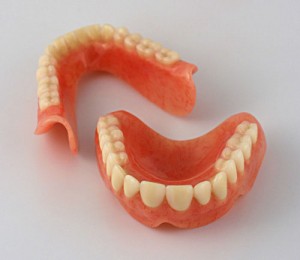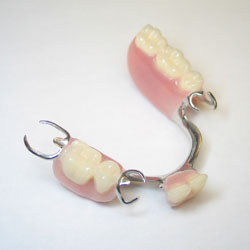A denture is a removable replacement for missing teeth and surrounding tissues. Two types of dentures are available – complete and partial dentures. Complete dentures are used when all the teeth are missing, while partial dentures are used when some natural teeth remain.
Complete Dentures
 Complete dentures can be either “conventional” or “immediate.” Made after the teeth have been removed and the gum tissue has begun to heal, a conventional denture is ready for placement in the mouth about 8 to 12 weeks after the teeth have been removed.
Complete dentures can be either “conventional” or “immediate.” Made after the teeth have been removed and the gum tissue has begun to heal, a conventional denture is ready for placement in the mouth about 8 to 12 weeks after the teeth have been removed.
Unlike conventional dentures, immediate dentures are made in advance and can be positioned as soon as the teeth are removed. As a result, the wearer does not have to be without teeth during the healing period. However, bones and gums shrink over time, especially during the healing period following tooth removal. Therefore a disadvantage of immediate dentures compared with conventional dentures is that they require more adjustments to fit properly during the healing process and generally should only be considered a temporary solution until conventional dentures can be made.
 Partial Dentures
Partial Dentures
A removable partial denture usually consists of replacement teeth attached to a pink or gum-colored plastic base, which is connected by metal framework that holds the denture in place in the mouth. Partial dentures are used when one or more natural teeth remain in the upper or lower jaw. Not only does a partial denture fill in the spaces created by missing teeth, it prevents other teeth from changing position. A precision partial denture is removable and has internal attachments rather than clasps that attach to the adjacent crowns. This is a more natural-looking appliance.
EATING
This will take practice to learn to eat a fairly normal diet with the introduction of new dentures. During the first several days we recommend a soft diet to eliminate potential sore spots with minimal discomfort. Avoid tough, sticky foods until you become more familiar with your new dentures.
SORE SPOTS
New dentures almost always cause some sore spots. These will be relieved during the first few post insertion appointments. When you do experience a sore spot, try to wear your denture as much as possible. This enables us to more accurately determine the cause of the sore spots. We recommend soft foods, and between appointments to rinse with warm salt water.
NIGHT TIME
While the denture is out of the mouth, we recommend that it be soaked in water or in a denture cleaning solution. Such practice will maintain much healthier oral tissue, preserve the ridges and underlying bone and allow the denture to fit properly for a longer period of time.
LONGEVITY
No denture will last forever. As time passes, the tissue and bone that support the denture will shrink. Generally, the denture will require a reline every couple of years to maintain a ideal fit.



